人教版八年级英语下册单元语法归纳及练习全套
人教版英语八年级下册单元知识点总结及同步练习 Unit3--4单元(无答案)
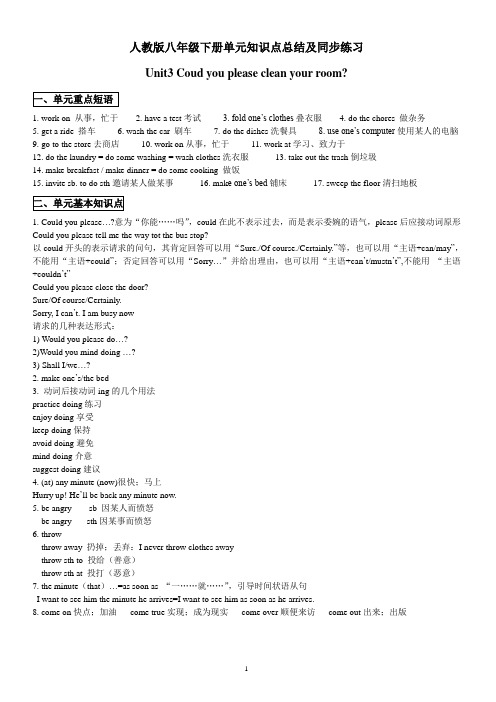
人教版八年级下册单元知识点总结及同步练习Unit3 Coud you please clean your room?1. work on 从事,忙于2. have a test考试3. fold one’s clothes叠衣服4. do the chores 做杂务5. get a ride 搭车6. wash the car 刷车7. do the dishes洗餐具8. use one’s computer使用某人的电脑9. go to the store去商店10. work on从事,忙于11. work at学习、致力于12. do the laundry = do some washing = wash clothes洗衣服13. take out the trash倒垃圾14. make breakfast / make dinner = do some cooking 做饭15. invite sb. to do sth邀请某人做某事16. mak e one’s bed铺床17. sweep the floor清扫地板1. Could you please…?意为“你能……吗”,could在此不表示过去,而是表示委婉的语气,please后应接动词原形Could you please tell me the way tot the bus stop?以could开头的表示请求的问句,其肯定回答可以用“Sure./Of course./Certainly.”等,也可以用“主语+can/may”,不能用“主语+could”;否定回答可以用“Sorry…”并给出理由,也可以用“主语+can’t/mustn’t”,不能用“主语+couldn’t”Could you please close the door?Sure/Of course/Certainly.Sorry, I can’t. I am busy now请求的几种表达形式:1) Would you please do…?2)Would you mind doing …?3) Shall I/we…?2. make one’s/the bed_________________3. 动词后接动词ing的几个用法practice doing练习enjoy doing享受keep doing保持avoid doing避免mind doing介意suggest doing建议4. (at) any minute (now)很快;马上Hurry up! He’ll be back any minute now.5. be angry ___ sb 因某人而愤怒be angry ___sth因某事而愤怒6. throwthrow away 扔掉;丢弃:I never throw clothes awaythrow sth to 投给(善意)throw sth at 投打(恶意)7. the minute(that)…=as soon as “一……就……”,引导时间状语从句I want to see him the minute he arrives=I want to see him as soon as he arrives.8. come on快点;加油come true实现;成为现实come over顺便来访come out出来;出版9. reply to sb/sth对某人/某物做出回答或反应10. all the time频繁;反复, 常常位于句末,强调在某段时间内一直进行或发生某事I have a dog and a cat, but they fight all the time.11. as…as…像……一样……表示两者在某方面程度相同,第一个as是副词,后应该跟形容词或副词的原级,第二个as是介词,后可跟名词,代词拓展:as…as…的否定形式是not as/so…as…“不如……;不与……一样”He studies as hard as his bother.He doesn’t study as/so hard as his brother12. neither1)neither did I 是“neither+be动词/助动词/情态动词+主语”结构,表示前者的否定情况也适用于后者。
人教版英语八年级下册Unit 1-5 单元语法知识梳理
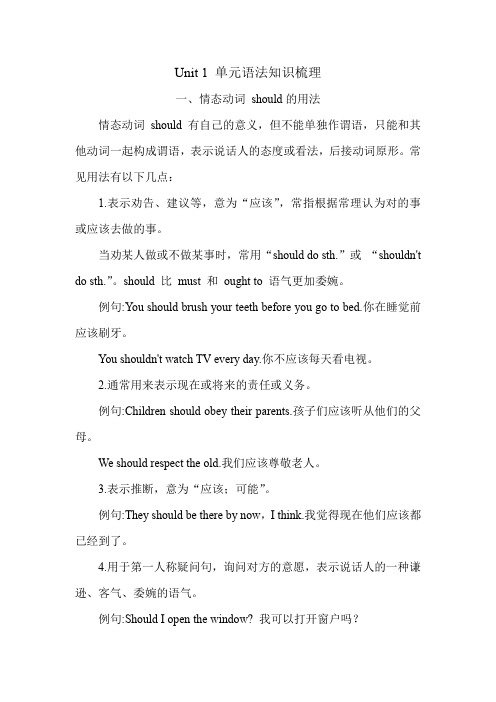
Unit 1 单元语法知识梳理一、情态动词should的用法情态动词should有自己的意义,但不能单独作谓语,只能和其他动词一起构成谓语,表示说话人的态度或看法,后接动词原形。
常见用法有以下几点:1.表示劝告、建议等,意为“应该”,常指根据常理认为对的事或应该去做的事。
当劝某人做或不做某事时,常用“should do sth.”或“shouldn't do sth.”。
should 比must 和ought to 语气更加委婉。
例句:You should brush your teeth before you go to bed.你在睡觉前应该刷牙。
You shouldn't watch TV every day.你不应该每天看电视。
2.通常用来表示现在或将来的责任或义务。
例句:Children should obey their parents.孩子们应该听从他们的父母。
We should respect the old.我们应该尊敬老人。
3.表示推断,意为“应该;可能”。
例句:They should be there by now,I think.我觉得现在他们应该都已经到了。
4.用于第一人称疑问句,询问对方的意愿,表示说话人的一种谦逊、客气、委婉的语气。
例句:Should I open the window? 我可以打开窗户吗?What should we do now? 我们现在该干什么呢?5.表示某种感情色彩,意为“竟会”,常用于以how, why开头引导的特殊疑问句中。
例句:Why should you be so early today? 你今天为什么会如此早?二、反身代词1.反身代词的构成反身代词是一种表示反射或强调的代词。
它由第一人称、第二人称的形容词性物主代词和第三人称代词的宾格加词尾-self或-selves构成。
其构成如下表:反身代词与它所指代的名词或代词形成互指关系,两者在人称和数上应保持一致。
人教版八年级下册英语Unit 10单元语法知识点总结

人教版八年级下册英语Unit 10单元语法知识点总结本单元重点短语的具体用法1. "These days":表示目前或现在的情况。
例如:These days, more and more people are using mobile phones.(现在,越来越多的人使用手机。
)2. "Regard with great interest":表示以极大的兴趣关注着。
例如:I always regard with great interest the development of technology.(我总是以极大的兴趣关注着技术的发展。
)3. "In order to":表示目的。
例如:She studies hard in order to get good grades.(她努力学习是为了取得好成绩。
)4. "So far":迄今为止,到现在为止。
例如:So far, we have learneda lot of new knowledge.(到目前为止,我们已经学到了很多新知识。
)5. "In need":需要。
例如:We should help those in need.(我们应该帮助那些需要帮助的人。
)6. "Not...anymore":不再......例如:He doesn't play basketball anymore.(他不再打篮球了。
)7. "Welcome to sp.":欢迎来到......例如:Welcome to our school.(欢迎来到我们学校。
)8. "Check out":察看、观察。
例如:Let's check out the new restaurant.(我们去看看那家新餐厅吧。
八年级下册人教版英语Unit 9 重点语法及练习题
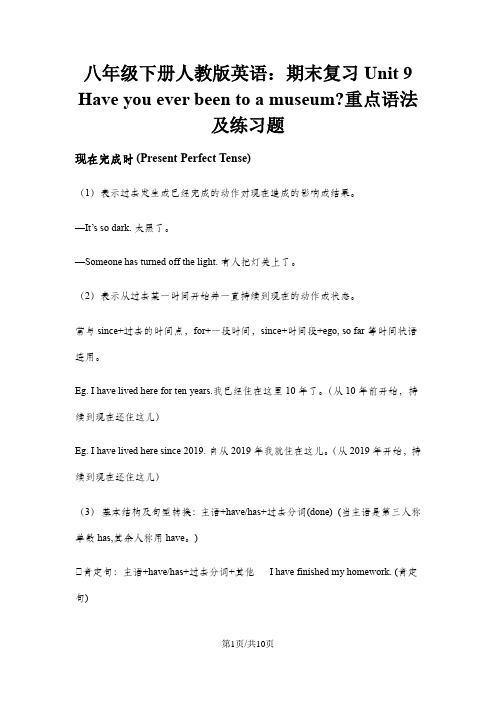
八年级下册人教版英语:期末复习Unit 9 Have you ever been to a museum?重点语法及练习题现在完成时(Present Perfect Tense)(1)表示过去发生或已经完成的动作对现在造成的影响或结果。
—It’s so dark.太黑了。
—Someone has turned off the light.有人把灯关上了。
(2)表示从过去某一时间开始并一直持续到现在的动作或状态。
常与since+过去的时间点,for+一段时间,since+时间段+ego,so far等时间状语连用。
Eg.I have lived here for ten years.我已经住在这里10年了。
(从10年前开始,持续到现在还住这儿)Eg.I have lived here since2019.自从2019年我就住在这儿。
(从2019年开始,持续到现在还住这儿)(3)基本结构及句型转换:主语+have/has+过去分词(done)(当主语是第三人称单数has,其余人称用have。
)①肯定句:主语+have/has+过去分词+其他I have finished my homework.(肯定句)①否定句:主语+have/has+not+过去分词+其他I have not finished my homework.(否定句)①一般疑问句:Have/Has+主语+过去分词+其他—Have you finished your homework?—Yes,I have./No,I haven’t,(一般疑问句及肯定、否定回答)(4)has gone(to),has been(to),has been(in)的区别Have/Has gone(to):去了(现在不在说话现场)Eg. ---Where is your father?---He has gone to Shanghai.Have/Has been(to):去过(已不在去过的地方)Eg.My father has been to Shanghai.Have/has been in:呆了多久(还在所呆的地方)Eg.My father has been in Shanghai for two months.=My father has been in Shangha i since two months ago.(5)现在完成时的标志:①常与just,already,yet,ever,never,before,so far等连用,强调动作的完成,不强调动作的持续。
人教版八年级英语下册各单元语法点汇总
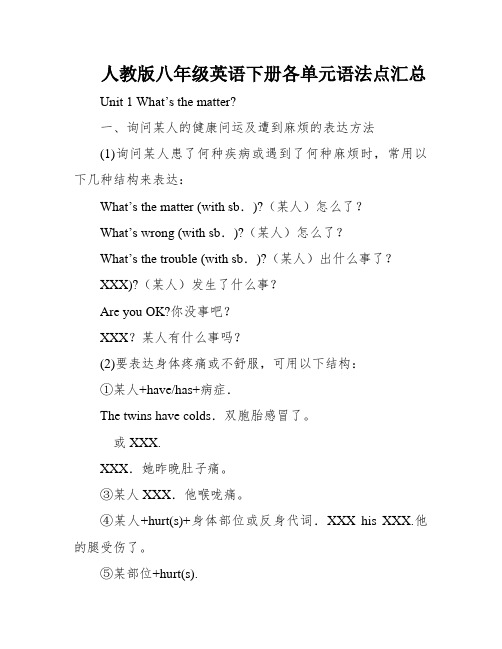
人教版八年级英语下册各单元语法点汇总Unit 1 What’s the matter?一、询问某人的健康问运及遭到麻烦的表达方法(1)询问某人患了何种疾病或遇到了何种麻烦时,常用以下几种结构来表达:What’s the matter (with sb.)?(某人)怎么了?What’s wrong (with sb.)?(某人)怎么了?What’s the trouble (with sb.)?(某人)出什么事了?XXX)?(某人)发生了什么事?Are you OK?你没事吧?XXX?某人有什么事吗?(2)要表达身体疼痛或不舒服,可用以下结构:①某人+have/has+病症.The twins have colds.双胞胎感冒了。
或XXX.XXX.她昨晚肚子痛。
③某人XXX.他喉咙痛。
④某人+hurt(s)+身体部位或反身代词.XXX his XXX.他的腿受伤了。
⑤某部位+hurt(s).My head hurts badly.我头痛得厉害。
⑥或人+have/has+a pain+in one’s+身体部位,I have a XXX.我胸口痛。
⑦(The re is)something wrong with one’s+身体部位.There is something wrong with my right eye..我的右眼有毛病。
⑧其他表达体式格局She has a heart trouble.她故意脏病。
He got hit on the head他头部受到了撞击。
XXX finger.她割破手指了。
二神态动词should的用法1.Should为情态动词,意为“应该;应当”,否定式为shouldn’t,其后接动词原形,无人称和数的变化。
常用来表示征询意见、建议、劝告、要求或义务等。
You should drink hot water with honey.你应该喝加有蜂蜜的开水。
He should put his head back他应该把头后仰。
人教版八年级英语下unit3重点短语及句型总汇+配套练习(附语法)

八年级下册复习学案Unit 3 What were you doing when the UFO arrived?一年级英语组吕书林一.重点短语1.in front of 在,,的前面(外部)in the front of 在,,的前面(内部)2.sleep late 睡懒觉sleep well 睡得好get to sleep=fall asleep 睡着3.walk down/along 沿,,走4.take off (飞机)起飞;脱下(衣帽)5.run away 跑开,逃跑6.buy/draw/make sth. for sb. 为某人买/画/制作7.in history 在历史上8.take place 发生(强调必然性)9.happen to sth./sb. 发生(强调偶然性)例如:What has happened to you?=What’s the matter with you?=What’s wrong with you?10.all over the world=around the world 遍及全世界11.next to 相邻,紧贴12.close to 接近于;在附近13.be ill in hospital/bed 生病住院/在床14.hear about/of 听说(间接听到)15.in silence 沉默不语keep silent 保持沉默16.an unusual experience 一次不寻常的经历17.have difficulty doing sth 干某事有困难18.have meaning to 对….有意义本单元目标句型:..?1.What were you doing when…2.I was doing sth. When+一般过去时的时间状语从句...3.While sth./sb. was doing sth., I was doing sth....Eg. What were you doing when the UFO landed?当不明飞行物着陆时,你正在干啥?While my mother was cooking, I was watching TV.当妈妈正在做饭时,我在看电视。
Unit 4 知识点总结+单元练习题人教版英语八年级下册(附答案)
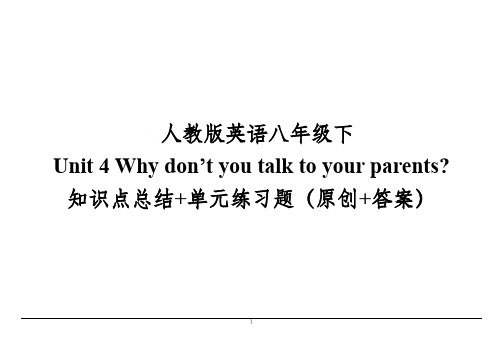
人教版英语八年级下Unit 4 Why don’t you talk to your parents?知识点总结+单元练习题(原创+答案)1一.重点词组:1.what’s wrong 哪不舒服?what’s wrong with sb 某人怎么了?2.look through 快速查看,浏览look up 查询look for 寻找look after 照顾look out = watch out 当心3.big deal 重要的事it’s not a big deal 不是要紧的事4.work out = figure out 解决,弄明白5.not...anymore 再也不6.cut out 删去pare...with 比较8.in one’s opinion 在某人看来9.hang out with sb 和某人闲逛10.after-school class 校外辅导课11.get into fight with sb 和某人打起来12.be angry with sb 对某人生气13.why don’t you do = why not do sth 为什么不做某事14.get on with sb 和某人相处得好15.be nice to sb 对某人友好16.mind sb doing sth 介意某人做某事17.on weekends 在周末二.重点单词1.allow v 允许allow doing sth 允许做某事allow sb to do sth 允许某人做某事sb is allowed to do sth 某人被允许去做某事2.guess v/n 猜have a guess = take a guess 猜一猜guess what? 您猜怎么着?3.deal v 处理;n 交易deal with sth 处理... = handle sth4.relation n 关系relative adj 相对的;n 亲戚relationship n 关系be related to sth 与...有关munication n 交流communicate v 交流6.argue v 争吵argue with sb 和某人争吵argument n 论点7.cloud n 云朵clouds 乌云8.instead adv 反而用法1:放在句首使用:She isn’t allowed to go out at this time of night. Instead, she should do her homework in her bedroom.用法2: 放在句尾连起来使用:She isn’t allowed to go out at this time of night. She should do her homework in her bedroom instead.instead of + 名词性短语9.nervous adj 焦虑的be nervous of/about sth10.offer v/n2offer sb sthprovide sth for sb = provide sb with sth supply sth for sb = supply sb with sth 11.proper adj 恰当的improper adj 不恰当的suitable adj 恰当的12.explain v 解释explanation n 解释13.clear adj 清晰的a clear day 晴天crystal clear 一清二楚的14.return v 返回return back 返还return to sb 还给某人15.member n 成员membership n 会员资格16.pressure n (物理)压力release pressure 释放压力stress (精神)压力reduce stress 减少压力pete v 竞争compete against sb 与某人竞争、攀比competition n 比赛competitive adj 竞争激烈的,好竞争的competent adj 有能力的,能胜任的18.skill n 技巧19.typical adj 典型的20.football n 美式橄榄球soccer 英式足球21.continue v 继续22.crazy adj 疯狂的be crazy about sth 对...感到痴狂23.push v 推push-up 俯卧撑pull v 拉24.develop v 发展development n 发展25.cause v 造成;n 原因cause sb to do sth 引起某人去做某事ual adj 平常的as usual 像往常一样27.perhaps adv 或许probably adv 或许possibly adv 或许34Unit 4 单元练习题一.重点词组考察二.重点单词考察三.课文翻译1. I have _____ _____ (太多) homework so I don’t have enough sleep.2. My parent don’t _____ _____ _____(允许我) hang out with my friends.3. I have _____ _____ (太多) after-school classes.4. I _____ _____ (陷入) a fight with my best friend.5. _____ _____ _____ (你为什么不)go to sleep earlier this evening?6. The house is _____ _____ (已经相当) clean and tidy.7. I found my sister _____ _____ (翻找) my things yesterday. 8. I guess you could tell her _____ _____ _____(去道歉).9. My problem is that I can’t _____ _____ _____ (和某人相处) my family. 10. My _____ _____ (大哥) is not very nice to me.11. He always _____ _____(拒绝) let me watch my favorite TV show. 12. It’s not easy _____ _____ _____ (处于你这个年龄). 13. You should _____ _____ _____ (提供去帮助).14. You don’t _____ _____ _____ _____ _____ _____ _____ (介意他一直在看电视).15. My sister borrows my clothes _____ _____ (没有问). 16. I am _____ _____ (担心) my school grades.17. You should tell him that _____ _____ _____ (抄别人的作业) is wrong. 18. _____ _____ _____ (他们中的许多人) are learning exam shills so that they can get into a good high school.19. They are always _____ _____ _____ (把他们和...做对比) other children.四.单项选择1.We can’t take this away until she _____ yes.A.will sayB. sayC. saysD. said2.She finally agrees with us _____ she did not like the plan at the beginning.A.ifB. unlessC. althoughD. when3.---Thanks for your sincere suggestion.---It’s my pleasure. Hope things _____.A.work outB. look outC. try outD. find out4.We are not allowed _____ or drink in the classroom.A.eatB. to eatC. eatingD. eaten5.The little boy _____ his book to the girl.A.providesB. suppliesC. bringsD. offers6.---Young people are always talking on their phones.---Yes, indeed. They should put down their phones and talk to people around them _____.A.stillB. eitherC. tooD. instead7.My _____ sister is three years _____ than me..A.elder; olderB. elder; elderC. older; elderD. older; older8.They didn’t leave for home _____ they finish their work.A.untilB. ifC. unless9.Chinese parents tend to compare their children _____ other kids.A.forB. toC. byD. with10.Do you mind me _____ the radio? It’s too noisy.A.turning upB. turning onC. turning downD. turn down11.Gloria offers _____ us prepare for the exams.A.helpB. to helpC. helpingD. helped12.Did you watch the TV show _____ the evening of August 24th?---Yes, I did. _____ my opinion, it’s wonderful.A.in, InB. in; OnC.on; OnD. on, In五.完形填空As though things weren’t 1._____ enough last spring, a wild turkey started showing up on my block. It’s normally one of the busiest intersections in Minneapolis, but this turkey walked down the sidewalk day after day 2._____ she belonged. As word 3._____ about her, more and more people came out to see her. A young woman told me that they had named her Tina—Tina the Turkey. Tina must have been 4._____ eggs in front of the neighbors’ house. She would sit and wiggle her rump in the same place in their yard every day. One day she walked with five other 5._____ through the parking lot, 6.______ the two-and-a-half-foot cement wall, and into the yard. I watched in surprise—six wild turkeys! One had her feathers ruffled; I think it must have been Tina. This was her 7._____ now. There were many days when Tina would stand in the parking lot—a dangerous place for a 8._____ bird—and refuse to move, blocking cars from coming or going. This became a show with Tina in the starring role until the day a new character appeared on stage: an strange-looking man with black hair. He looked 9._____. He was covered in dirt, his posture stiff. He approached Tina and began to strike curious poses in a beautiful dance. Tina 10._____ him in this dance. Together, they were art in motion. And because of the stay-at-home order, I got to see them. I’ll always remember this turkey when I think back on the corona-virus pandemic. She brought a lot of joy to a community at a time when people desperately needed an escape.1.A. funny B. strange C. wonderful D. humorous2.A. as if B. if C. even if D. even though3.A. gave out B. handed out C. set out D. got out4.A. lying B. laying C. lied D. laid5.A. neighbors B. places C. turkeys D. women6.A. on B. up C. in D. with7.A. place B. turkey C. right D. wall8.A. fat B. strong C. powerful D. slow-moving9.A. homeless B. hopeless C. strange D. careful510.A. embraced B. joined C. welcomed D. invited 答案:一.重点词组1.what’s wrong with sb2.look through3.look for4.big deal5.look out6.work out7.not ... anymore8.cut outpare ... with ...10.hang out with sb11.after-school class12.in one’s opinion13.get into fight with sb14.be angry at sb15.be friendly to/with sb16.on weekends17.sllow doing sth18.allow sb to do sth19.be allowed to do sth20.guess what21.a clear day22.crystal clear23.return back24.return to sb25.be crazy about26.cause sb to do sth27.as usualpete with/against29.help with sth630.reduce stress; release pressure31.be related to32.find sb doing sth二.重点单词1.relation2.relativemunication; communicate4.argument5.clouds6.continue7.anyway8.proper; improper9.sick; ill10.member11.membership12.neighborhood13.typical三.课文翻译1.too much2.allow me to3.too many4.get into5.Why don’t you6.already pretty7.looking through8.to say sorry9.get on with10.elder brother11.refuses to12.being your age13.offer to help14.mind him watching TV all the time15.without asking16.worried about17.copying others’ homework18.Many of thempare them with四.单项选择1-5 CCABD5-10 DAADC11-12 BD五.完形填空1-5 BADBC6-10 BADAB7。
2024年人教版中考英语一轮复习八年级下册Units9-10单元 单词变形及语法汇总
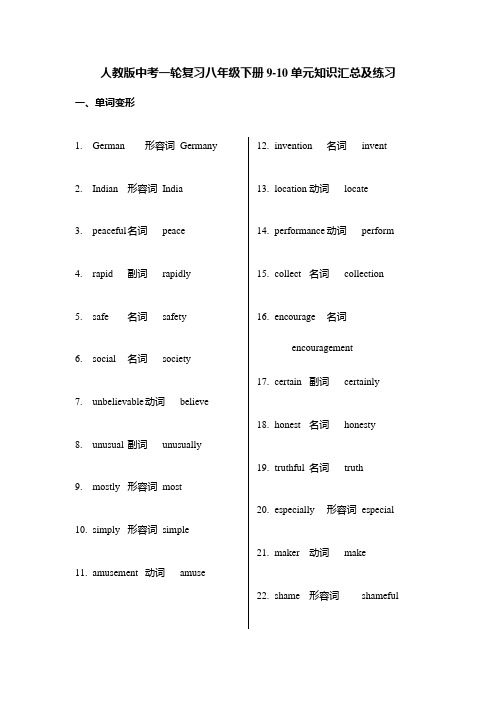
人教版中考一轮复习八年级下册9-10单元知识汇总及练习一、单词变形1.German 形容词Germany2.Indian 形容词India3.peaceful 名词peace4.rapid 副词rapidly5.safe 名词safety6.social 名词society7.unbelievable 动词believe8.unusual 副词unusually9.mostly 形容词most10.simply 形容词simple11.amusement 动词amuse 12.invention 名词invent13.location 动词locate14.performance 动词perform15.collect 名词collection16.encourage 名词encouragement17.certain 副词certainly18.honest 名词honesty19.truthful 名词truth20.especially 形容词especial21.maker 动词make22.shame 形容词shameful二、重点短语1.have a yard sale 举行庭院拍卖会2. bring sth. back 带回, 使回忆3. consider doing sth 考虑做什么4. in need 需要5. board games 棋类游戏6. check out察看;观察7. no longer 不再8. at first 起初9. as for 至于,关于10. close to… 靠…近的11. to be honest 老实说,说实话12. millions of 数百万的13. most of 大多数的...14. in fact 事实上15. a tour guide 一名导游16. help sb. (to) do 帮助某人做某事17. start doing sth. 开始做某事18. start to do sth. 开始做某事19. take a holiday 度假20. three quarters 四分之三21. all the year round 一年到头,终年22. a couple of 两个,一对,几个三、语法现在完成时非延续性动词和延续性动词之间的转换1.转换为相应的延续性动词,用于现在完成时。
人教版八年级英语下册单元语法归纳及练习全套
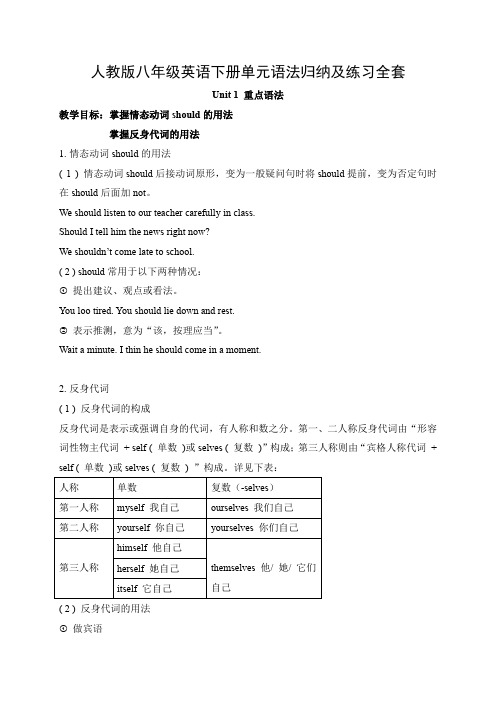
人教版八年级英语下册单元语法归纳及练习全套Unit 1 重点语法教学目标:掌握情态动词should的用法掌握反身代词的用法1.情态动词should的用法( 1 ) 情态动词should后接动词原形,变为一般疑问句时将should提前,变为否定句时在should后面加not。
We should listen to our teacher carefully in class.Should I tell him the news right now?We shouldn’t come late to school.( 2 ) should常用于以下两种情况:①提出建议、观点或看法。
You loo tired. You should lie down and rest.②表示推测,意为“该,按理应当”。
Wait a minute. I thin he should come in a moment.2.反身代词( 1 ) 反身代词的构成反身代词是表示或强调自身的代词,有人称和数之分。
第一、二人称反身代词由“形容词性物主代词+ self ( 单数)或selves ( 复数)”构成;第三人称则由“宾格人称代词+ self ( 单数)或selves ( 复数) ”构成。
详见下表:( 2 ) 反身代词的用法①做宾语You must loo after yourself well and eep healthy.The child can dress himself.②做同位语He didn’t often go shopping himself.= He himself didn’t often go shopping.③做主语在现代英语中,反身代词一般不能独立用作主语,但是它可以借助and, or, nor等连词与其他名词一起构成并列主语(且位于并列主语的后部),以及用于某些特殊结构(如as...as 等)。
新人教版八年级英语下册知识点归纳总结大全+课本练习参考答案

新人教版八年级英语下册知识点归纳总结大全+课本练习参考答案新人教版八年级英语下册知识点归纳总结复习大全Unti1 what’s the matter?短语归纳1.too much 太多2.lie down 躺下3.get an X-ray 做个X光检查4.take one ’s temperature 量体温5.put some medicine on ......在....上敷药6.have a fever 发烧7.take breaks /take a break 休息8.without thinking twice 没多想9.get off 下车10.take sb to the hospital 送某人去医院11.wait for等待12.to one’s surprise 使.......惊讶的thanks to多亏于;由于14.in time及时15.think about 考虑16.have a heart problem患有心脏病17.get into the trouble 遇到麻烦18.do the right thing做正确的事情事情19.fall down 摔倒20.put ...... on sth把...放在某物上21.get hit/sunburned 摔伤/烧伤22.be interested in 对.....感兴趣23.be used to 习惯于.... 24.take risks/take a risk 挑战25.lose one’s life 失去生命26.because of 因为27.run out of 用完28.cut off 切除29.get out of 从...出来30.make a decision/decisions 做决定31.be in control of 掌管;管理32.give up 放弃用法归纳1.need to do sth .需要去做某事2.see sb doing sth 看见某人正在做某事3.ask sb sth 询问某人某事4.expect sb to do sth 期望某人做某事5.agree to do sth 想要做某事6.help sb (to) do sth 帮助某人做某事7.want to do sth 想要做某事8.tell sb to do sth 告诉某人做某事9.have problems(in) doing sth 做某事有困难e sth to do sth用某物去做某事11.be/get used to doing sth 习惯于做某事12.seem to do sth 好像做某事13.keep on doing sth 继续做某事14.mind doing sth 介意做某事语法点1.询问某人的健康问题及遇到麻烦的表达方法2.情态动词should的用法情态动词should的用法表示劝告与建议,也表义务与责任第一人称问句中,征询建议要记清3.不定代词的用法相关阅读方法推理判断阅读法精细解读1. What’s the matter (with you)? 怎么了?出什么事了?What’s the trouble/ the problem / wrong with sb./ sth.?2. I had a cold.我感冒了。
人教版英语八年级下册第一单元语法归纳

语法1. 情态动词should的用法should意为“应该”,后跟动词原形,表示责任和义务。
其结构为:主语+should/shouldn't(shouldn't =should not不应该)+动词原形。
如:①You should lie down and rest.你应该躺下休息。
②He shouldn't go to school when he has a cold.他感冒时不应该去上学。
2. 实义动词have用于描述健康问题(1)询问病情。
What's the matter with you?或What's wrong with you? 你哪里不舒服?(2)实义动词have表述病情。
have有“患(病)”的意思,表示“具有某种病症、症状”,常用“have+a+名词”。
其中a不能用the代替,也不能去掉,但翻译时不用译出。
例如:have/catch/get a cold 感冒have a fever 发烧have a sore back/have a backache 背痛have a stomachache 胃痛have a cough 咳嗽have a sore throat 咽喉痛have a toothache 牙痛have a headache 头痛3. 反身代词的常用短语by oneself 独自teach oneself sth.=learn sth. by oneself 自学……enjoy oneself 玩得开心help oneself (to sth.) 请自便……introduce oneself 自我介绍make oneself at home 不用见外、不用客气dress oneself 自己穿衣服lose oneself in 沉浸于……之中say/talk/speak to oneself 自言自语express oneself(清楚地)表达自己behave oneself 举止得体4. in time和on time的区别in time表示“及时”,指在约定的时间之前发生。
人教版英语八年级下册单元知识点总结及同步练习 Unit9--10单元(无答案)
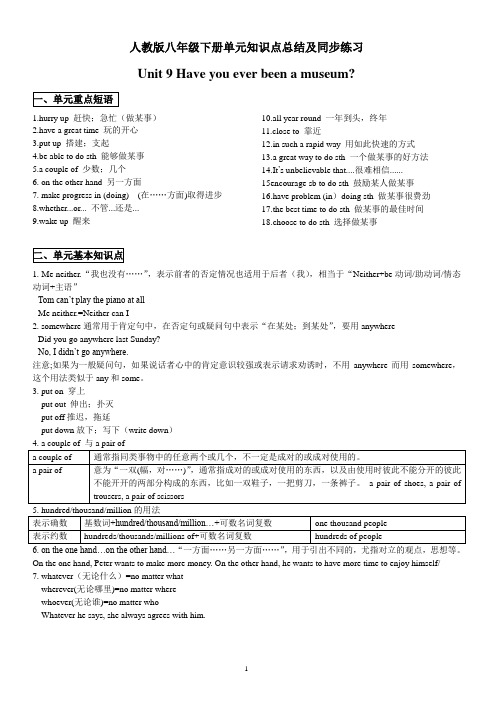
人教版八年级下册单元知识点总结及同步练习Unit 9 Have you ever been a museum?1.hurry up 赶快;急忙(做某事)2.have a great time 玩的开心3.put up 搭建;支起4.be able to do sth 能够做某事5.a couple of 少数;几个6. on the other hand 另一方面7. make progress in (doing) (在……方面)取得进步8.whether...or... 不管...还是...9.wake up 醒来10.all year round 一年到头,终年11.close to 靠近12.in such a rapid way 用如此快速的方式13.a great way to do sth 一个做某事的好方法14.It’s unbelievable that....很难相信......15encourage sb to do sth 鼓励某人做某事16.have problem (in)doing sth 做某事很费劲17.the best time to do sth 做某事的最佳时间18.choose to do sth 选择做某事1. Me neither.“我也没有……”,表示前者的否定情况也适用于后者(我),相当于“Neither+be动词/助动词/情态动词+主语”--Tom can’t play the piano at all--Me neither.=Neither can I2. somewhere通常用于肯定句中,在否定句或疑问句中表示“在某处;到某处”,要用anywhere--Did you go anywhere last Sunday?--No, I didn’t go anywhere.注意;如果为一般疑问句,如果说话者心中的肯定意识较强或表示请求劝诱时,不用anywhere而用somewhere,这个用法类似于any和some。
人教版初中英语八年级下册全册各单元知识点、语法归纳整理
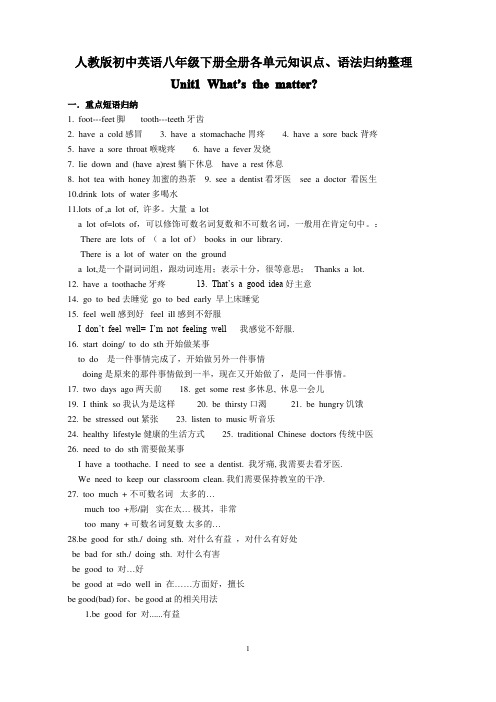
人教版初中英语八年级下册全册各单元知识点、语法归纳整理Unit1W hat’s the matter?一.重点短语归纳1.foot---feet脚tooth---teeth牙齿2.have a cold感冒3.have a stomachache胃疼4.have a sore back背疼5.have a sore throat喉咙疼6.have a fever发烧7.lie down and(have a)rest躺下休息have a rest休息8.hot tea with honey加蜜的热茶9.see a dentist看牙医see a doctor看医生10.drink lots of water多喝水11.lots of ,a lot of,许多。
大量a lota lot of=lots of,可以修饰可数名词复数和不可数名词,一般用在肯定句中。
:There are lots of(a lot of)books in our library.There is a lot of water on the grounda lot,是一个副词词组,跟动词连用;表示十分,很等意思;Thanks a lot.12.have a toothache牙疼13.That’s a good idea好主意14.go to bed去睡觉go to bed early早上床睡觉15.feel well感到好 feel ill感到不舒服I don’t feel well=I’m not feeling well我感觉不舒服.16.start doing/to do sth开始做某事to do是一件事情完成了,开始做另外一件事情doing是原来的那件事情做到一半,现在又开始做了,是同一件事情。
17.two days ago两天前18.get some rest多休息,休息一会儿19.I think so我认为是这样20.be thirsty口渴21.be hungry饥饿22.be stressed out紧张23.listen to music听音乐24.healthy lifestyle健康的生活方式25.traditional Chinese doctors传统中医26.need to do sth需要做某事I have a toothache.I need to see a dentist.我牙痛,我需要去看牙医.We need to keep our classroom clean.我们需要保持教室的干净.27.too much+不可数名词太多的…much too+形/副实在太…极其,非常too many+可数名词复数太多的…28.be good for sth./doing sth.对什么有益,对什么有好处be bad for sth./doing sth.对什么有害be good to对…好be good at=do well in在……方面好,擅长be good(bad) for、be good at的相关用法1.be good for对......有益Doing morning exercises is good for your health.做早操对你们的建康有益。
人教版英语八年级下册单元知识点总结及同步练习 Unit5--6单元(无答案)

人教版八年级下册单元知识点总结及同步练习Unit 5 What were you doing when the rainstorm came?1. make sure 确信;确认2. beat against …拍打… …3. fall asleep 进人梦乡;睡着4. die down 逐渐变弱;逐渐消失5. wake up 醒来6. in a mess 一团糟7. break … apart 使……分离8. in times of difficulty 在困难的时候9. at the time of 当……时候10. go off (闹钟)发出响声11. take a hot shower 洗热水澡12. miss the bus 错过公交车13. pick up 接电话14. bring … together 使……靠拢15. in the area 在这个地区16. miss the event 错过...事件17. by the side of the road 在路边18. the Animal Helpline 动物保护热线19. walk by 走路经过20. make one’s way to… 在某人去……的路上21. hear the news 听到这个消息22. important events in history 历史上的重大事件23. for example 例如24. be killed 被杀害25. over fifty 50多(岁)26. a school pupil 一个小学生27. on the radio 通过广播28. in silence 沉默;无声29. more recently 最近地;新近30. the World Trade Center 世贸中心31. take down 拆除;摧毁32. have meaning to 对……有意义33. remember doing sth. 记得做过某事34. at first 首先;最初1.so…that…“如此……以至于……”,引导结果状语从句,so后常跟形容词或副词Tom is so helpful that we all like him.1)当主句和从句的主语一致,且that从句是肯定句时,可用“enough to do sth”来转换He was so clever that he could understand what I said. =He was clever enough to understand what I said.2)当主句和从句的主语不一致,且that从句是肯定句时,可以用“enough for sb to do sth”来替换,但须注意不定式的宾语要省略。
人教版英语八年级下册unit7--unit810单元知识点讲解+练习题张
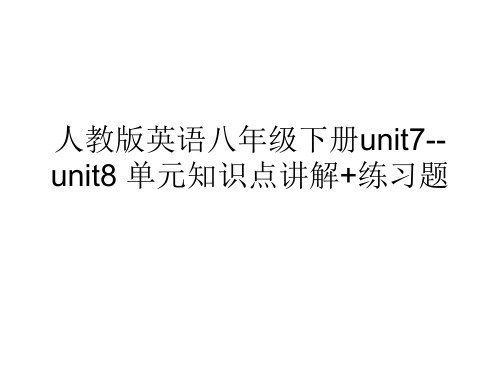
5. We must consider how ___A_____ this
problem quickly. There is little time left.
A. to solve
B. solve
C. solving
D. solved
6. Jack hasn’t taken his piano lessons for a long time. He is considering ___C_____ them.
D. n. 行业;活动范
围
熟 E. v. 沿……形成行(或列、排) 词 (1)There was a line of trees on either side of the
新 road.________ A
义 (2)(2017株洲阅读技能A)Our lines can get very busy, but please keep trying and you will soon get
D. yet
8. —Have you had the English test ________?
—NoC, not yet. But we have had the math test
already.
A. already
B. still
C. yet
D. hardly
9. I have ________ told Bob the good news.
考向1:population是名词,意为“人口; 人口数量”,作主语时谓语动词要用单数形式。 当其前面有分数或百分数等词修饰时,表示整 体中的一部分人,谓语动词用复数形式。如: On the one hand, more than three quarters of the population are Chinese, so you can simply speak Putonghua a lot of the time.一方面,超 过3/4的人口都是中国人,所以你可以随时随 地只讲普通话。[八(下)Unit 9 P 70]
人教版八年级英语下册1-5单元知识点归纳
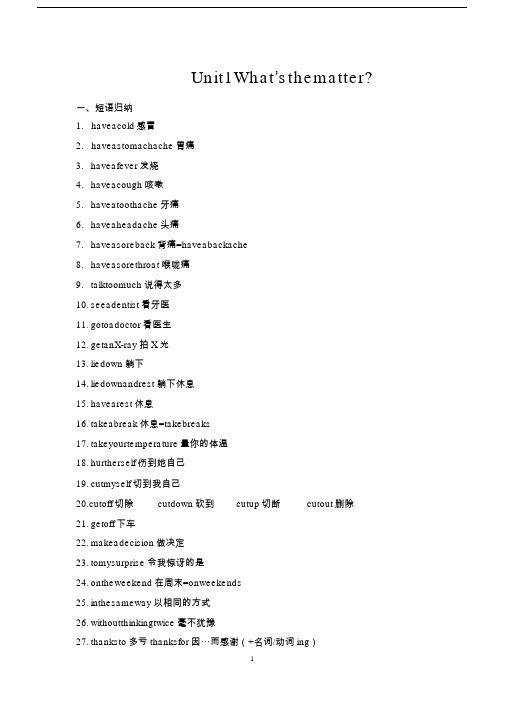
Unit1What’sthematter?一、短语归纳1.haveacold感冒2.haveastomachache胃痛3.haveafever发烧4.haveacough咳嗽5.haveatoothache牙痛6.haveaheadache头痛7.haveasoreback背痛=haveabackache8.haveasorethroat喉咙痛9.talktoomuch说得太多10.seeadentist看牙医11.gotoadoctor看医生12.getanX-ray拍X光13.liedown躺下14.liedownandrest躺下休息15.havearest休息16.takeabreak休息=takebreaks17.takeyourtemperature量你的体温18.hurtherself伤到她自己19.cutmyself切到我自己20.cutoff切除cutdown砍到cutup切断cutout删除21.getoff下车22.makeadecision做决定23.tomysurprise令我惊讶的是24.ontheweekend在周末=onweekends25.inthesameway以相同的方式26.withoutthinkingtwice毫不犹豫27.thanksto多亏thanksfor因⋯而感谢(+名词/动词ing)28.intime及时ontime按时29.savealife挽救生命30.getintotrouble陷入麻烦31.rightaway马上32.falldown跌倒33.waitfor等待34.beinterestedindoingsth.对做某事感兴趣35.giveup放弃二、用法集萃1.询问有什么病或有什么麻烦:What’sthematter(withsb.)?2.疾病的表达:have/hasa+疾病名称3.太多:toomuch+不可数名词;toomany+可数名词复数形式太:muchtoo+形容词4. enough足够的:①形容词+enough②enough+名词③itisenough+todosth.5. lie躺下过去式:lay现在分词:lying6.seesb.doingsth.看见某人正在做某事(正在进行)seesb.dosth.看见某人做了某事(看见动作的全过程)7.expecttodosth.期望做某事8.needtodosth.需要做某事9.helpsb.(to)dosth.帮助某人做某事10.tellsb.(not)todosth.告诉某人(不要)做某事11.asksb.todosth.要求某人做某事12.wanttodosth.想要做某事13.agreetodosth同.意做某事disagreetodosth.不同意做某事agreewithsb.同意某人的意见14.trouble问题;麻烦havetrouble/problemdoingsth.做某事有困难15.介词+doing常见的介词有:at;for;with;without;inabout16.be/getusedtodoingsth.习惯于做某事17.keepondoingsth.继续做某事18.minddoingtsh.介意做某事19.反身代词:myself我自己yourself你自己himself他自己herself她自己itself它自己复数:ourselves我们自己yourselves你们自己themselves他们自己20.knife-knives刀名词复数规则变化:①一般情况+s②以e结尾+s③以s、x、ch、sh结尾+es④以辅音字母+y结尾,变y为i+es⑤以o结尾,有生命+es;无生命+s⑥以f/fe结尾,变f/fe为v+es不规则变化:foot-feet脚、足tooth-teeth牙齿man-men男人woman-women女人mouse-mice老鼠21.important重要的importance重要性different不同的difference差异性22.death死亡(名词)die死(动词)dead死的(形容词)三、书面表达Howtokeephealthy如何保持健康Healthisimportant.Everyonewantstobehealthy.Letmetellyouhowtokeephealthy.Firstofall,weshouldeathealthyfood.Weshouldeatmorevegetablesandfruit.Wealson eedtodrinkmilk.Secondly,weshouldexercisealot.Weshoulddosomesportsafterschool.Finally,weshouldhaveenoughsleep.Tohaveagoodrest,weshouldgotobedearlyandgetupearly.Ithinkitisimportantforustokeephealthy.3Unit2I’llhelptocleanupthecityparks.一、短语归纳1. cleanup打扫干净cheerup使兴起来代词放中间2.giveout分发3.handout分发eupwith想出;提出(idea、plan等)5. putoff推迟puton穿衣服putup张贴putaway把⋯收好6.callup打电话;征召edtodosth.曾经做某事beusedtodingsth习.惯于做某事8. lonely孤独的(常用于feel之后)alone独自一人9.carefor照顾=takecareof10.afeelingofsatisfaction一种满足感11.tryout参加⋯选拔12.raisemoney募捐13.fixup修理14.giveaway赠送(money、oldclothes/books等)giveup放弃15.takeafter(外貌或行为)像16.besimilarto与⋯相似17.setup建立18.makeadifference影响;有作用19.disabledpeople残疾人20.makeaplan制定计划21.oldpeople’shome养老院22.helpoutwithsth.帮助解决困难23.abooklover书迷24.attheageof在⋯岁时etrue实现(与dream连用)26.atthesametime同时27.homelesspeople无家可归的人28.beworriedabout为⋯而担心worryabout担心29.forexample例如30.runoutof用完31.not⋯anymore不再32.atonce立刻;马上=rightaway二、用法集萃1.volunteertodosth自愿做某事2. difficult困难的difficulty困难havedifficulty(in)doingsth.做某事有困难3.excited兴奋的(人作主语)exciting使人兴奋的(物作主语)口诀:人+ed物+ing4.疑问词(how,what,where)+todo5. decidetodosth.决定做某事名词形式:decision makeadecision做决定6.learntodosth.学习做某事7.agoodwaytodosth.做某事的好方法8.wouldliketodosth.=wanttodosth.想要做某事9.thankyouforsth./doingsth.因某事/做某事而感谢10.kind善良的kindness善意Unit3Couldyoupleasecleanyourroom?一、短语归纳1.dothedishes清洗餐具2.takeouttherubbish倒垃圾3.foldtheclothes叠衣服foldmy/your/hisclothes4.sweepthefloor扫地5.makethebed铺床makemy/your/hisbed6.cleanthelivingroom打扫客厅7.helpoutwithsth.帮助解决某事8.atleast至少eover过来;顺便来访10.infrontof在⋯前面11.takethedogforawalk遛狗12.allthetime一直13.assoonas一⋯就⋯14.insurprise惊讶地15.hangout闲逛16.dochores做家务17.awasteoftime浪费时间18.inorderto为了19.getgoodgrades取得好成绩20.dependon依靠21.takecareof=carefor=lookafter照顾22.asaresult结果23.fallill生病二、用法集萃1.finishdoingsth.完成做某事2.if如果(主将从现,if后为从句,用一般现在时);是否(位于动词之后)3.assoonas一⋯就⋯.主将从现,assoonas后为从句4.replyangrily生气地回答(副词修饰动词,一般位于动词之后)abeautifuldog一只漂亮的狗(形容词修饰,名词,位于名词前)口诀:形名动副5.beangrywithsb.生某人的气6.as+形容词原级+as和⋯一样7.neitherdidI我也没有neither+be动词/助动词(do/does/did)/情态动词+主语“主语也不⋯..”so+be动词/助动词(do/does/did)/情态动词+主语“主语也⋯”8.can-could可以can,could还可以表示请求,could比can更有礼貌肯定回答:Sure./Ofcourse./Noproblem./Yes,sure.否定回答:No,youcan’t./Sorry,Ican’t.9.asksb.todosth.要求某人做某事10.borrow⋯from⋯跟⋯借(借进来)lend⋯to⋯把⋯借给⋯.(借出去)11.invitesb.todosth.邀请某人做某事12.helpwithsth.helpsb.(to)dotsh.帮助做某事13.havetimetodosth.有时间做某事havenotimetodosth没.时间做某事14.letsb.dosth.让某人做某事15.makesb.dosth.让某人做某事16.spend花费人+spend+时间+onsth/doingsth在某事上花时间/花时间做某事cost花费物+cost+金钱$某物花了多少钱take(took)花费Ittakes/tooksb.+时间+todo.做某事花了某人多少时间payfor付费17.itis+adj(forsb.)+todosth.做某事对某人而言是⋯的18.fair公平的unfair不公平的fairness公平性19.doone’spartindoingsth.尽自己的职责做某事20.the+比较级,the+比较级越...越⋯比较级and比较级越⋯越⋯theearlier⋯thebetter越早越好betterandbetter越来越好Unit4Whydon’tyoutalktoyourparents?一、短语归纳1.talkto/withsb.与某人交谈talkaboutsth.谈论某事2.freetime空闲时间3.allowab.todosth.允许某人做某事allowdoingsth.允许做某事4.hangout闲逛5.getintoafight争吵;打架6.sothat为了;以便于7.lookthrough浏览;快速查看8.workout成功地发展;解决9.getonwith/getalongwith和睦相处municatewithsb.与某人交谈11.abigdeal重要的事petewithsb.与某人竞争13.examskills应试技巧14.cutout删除pare⋯with⋯比较16.not..until直到⋯才17.arguewithsb.与某人争吵18.noproblem没问题19.not..anymore不再20.inmyopinion依我看21.thanksfor因⋯而感谢22.allkindsof各种各样的23.worryabout为⋯而担心=beworriedabout二、用法集萃1.提建议句型:①Youshould/shouldn’t dosth.②How/Whataboutdoingsth.?③Whydon’tyoudosth.?④Whynotdosth.?⑤Shallwedosth.?⑥Let’sdosth.⑦You’dbetterdosth.⑧Wouldyouminddoingsth.?常见回答:Goodidea./Soundsinteresting./I’dliketo./Great.否定:I’dloveto,butIhaveto⋯/Sorry,Ican’t.2.beangrywithsb.生某人的气3. although/though虽然不与but连用4.advice建议(不可数名词)5.refusetodosth.拒绝做某事6.instead代替;反而(位于句首或句尾)insteadof代替(位于句中)7.offertohelp提供帮助8.minddoingsth.介意做某事9.continuetodo/doingath.继续做某事10.keepondoingsth.继续做某事11.afew一些(肯定)few一点点(否定)修饰可数名词复数形式alittle一些(肯定)little一点点(否定)修饰不可数名词做题步骤:先看横线后的名词,判断可数还是不可数;其次,理解句子表达的肯定还是否定12.it’s timeforsth.该做某事了=it’stimetodosth.pete竞争(动词)competition竞争(名词)14.havetimetodosth有.时间做某事Unit5Whatwereyoudoingwhentherainstormcame?一、短语归纳1.gooff闹钟发出响声2.rainheavily下大雨3.pickup接电话;采摘4.atfirst起先5.fallasleep进入梦乡6.diedown逐渐变弱7.havealook看一看8.makeone’sway费力地前进9.insilence沉默10.takedown拆除;往下拽;记录11.atthetimeof⋯当⋯.的时候12.waitfor等待13.atthattime在那时(一般过去时标志词)14.wakeup醒来15.goshopping去购物16.takeashower洗澡17.inamess乱七八糟18.forexample例如19.makesure确保二、用法集萃1.过去进行时定义:表示在过去某一时刻或某一时间段正在进行的动作。
人教版八年级英语下册单元语法归纳及练习全套

人教版八年级英语下册单元语法归纳及练习全套Unit 1 重点语法教学目标:掌握情态动词should的用法掌握反身代词的用法1.情态动词should的用法( 1 ) 情态动词should后接动词原形,变为一般疑问句时将should提前,变为否定句时在should后面加not。
We should listen to our teacher carefully in class.Should I tell him the news right now?We shouldn’t come late to school.( 2 ) should常用于以下两种情况:①提出建议、观点或看法。
You look tired. You should lie down and rest.②表示推测,意为“该,按理应当”。
Wait a minute. I think he should come in a moment.2.反身代词( 1 ) 反身代词的构成反身代词是表示或强调自身的代词,有人称和数之分。
第一、二人称反身代词由“形容词性物主代词+ self ( 单数)或selves ( 复数)”构成;第三人称则由“宾格人称代词+ self ( 单数)或selves ( 复数) ”构成。
详见下表:( 2 ) 反身代词的用法①做宾语You must look after yourself well and keep healthy.The child can dress himself.②做同位语He didn’t often go shopping himself.= He himself didn’t often go shopping.③做主语在现代英语中,反身代词一般不能独立用作主语,但是它可以借助and, or, nor等连词与其他名词一起构成并列主语(且位于并列主语的后部),以及用于某些特殊结构(如as...as 等)。
人教版八年级下册英语Unit 6单元语法知识点总结

人教版八年级下册英语Unit 6单元语法知识点总结本单元重点短语的具体用法1. watch TV:看电视。
例如:I like to watch TV in the evening.(我喜欢晚上看电视。
)2. read a newspaper:看报纸。
例如:He reads a newspaper every morning.(他每天早上看报纸。
)3. talk on the phone:通过电话交谈。
例如:She is talking on the phone with her friend.(她正在和朋友通电话。
)4. listen to a CD:听CD。
例如:I often listen to a CD to relax.(我经常听CD 来放松。
)5. a useful book:一本有用的书。
例如:This is a very useful book for learning English.(这是一本学习英语非常有用的书。
)6. make soup:做汤。
例如:My mom is making soup in the kitchen.(我妈妈正在厨房做汤。
)7. wash the dishes:洗碟子。
例如:It's your turn to wash the dishes.(轮到你洗碟子了。
)8. go to the movies:去看电影。
例如:Let's go to the movies this weekend.(我们这周末去看电影吧。
)9. at home:在家。
例如:I stayed at home all day yesterday.(我昨天一整天都待在家里。
)10. eat out:在外面吃。
例如:We decided to eat out instead of cooking.(我们决定出去吃而不是做饭。
)11. drink tea:喝茶。
例如:Do you like to drink tea or coffee?(你喜欢喝茶还是咖啡?)12. Dragon Boat Festival:端午节。
- 1、下载文档前请自行甄别文档内容的完整性,平台不提供额外的编辑、内容补充、找答案等附加服务。
- 2、"仅部分预览"的文档,不可在线预览部分如存在完整性等问题,可反馈申请退款(可完整预览的文档不适用该条件!)。
- 3、如文档侵犯您的权益,请联系客服反馈,我们会尽快为您处理(人工客服工作时间:9:00-18:30)。
人教版八年级英语下册单元语法归纳及练习全套Unit 1 重点语法教学目标:掌握情态动词should的用法掌握反身代词的用法1.情态动词should的用法( 1 ) 情态动词should后接动词原形,变为一般疑问句时将should 提前,变为否定句。
后面加not时在shouldWe should listen to our teacher carefully in class. Should I tell him the news right now?t come late to school. We shouldn'常用于以下两种情况:( 2 ) should提出建议、观点或看法。
You loo tired. You should lie down and rest.表示推测,意为“该,按理应当”。
Wait a minute. I thin he should come in a moment.2.反身代词( 1 )反身代词的构成反身代词是表示或强调自身的代词,有人称和数之分。
第一、二人称反身代词由“形容词性物主代词+ self ( 单数)或selves (复数)”构成;第三人称则由“宾格人称单数)或selves ( 复数代词+ self ( ) ”构成。
详见下表:复数(单数-selves人称)ourselves 我们自己myself 我自己第一人称yourselves 你们自己第二人称yourself你自己himself 他自己第三人称themselves他/她/ 它她自己herself们自己它自己itself 反身代词的用法( 2 ) 做宾语You must loo after yourself well and eep healthy. The child can dress himself.做同位语He didn't often go shopping himself. = He himself didn't often go shopping.做主语在现代英语中,反身代词一般不能独立用作主语,但是它可以借助and, or, nor等连(如,以及用于某些特殊结构词与其他名词一起构成并列主语(且位于并列主语的后部)。
等)as...asMy brother and myself went there yesterday.He was as anious as myself.s sister and himself get up at si every day. Jim'含反身代词的短语小结( 3 )亲自独自,单独for oneselfby oneself自学自学learn...by oneself teach oneself自言自语say to oneself enjoy oneself 玩得开心喝意吃/ oneself dress oneself穿衣服help to...随......点I am able to do it by myself.I teach myself English in my spare time.They enjoyed themselves at the party.基础巩固---- Many people play with mobile phones all day instead of reading boos. 1.s too bad. Everyone _______ be a boo lover. Reading is more---- That'enjoyable.may B. should C. wouldA.---- Your uncle is very good at cooing! How did he learn it ?2.---- He learned it by _______.A.HimB. himselfC. herD. herself专项提升一、单句语法填空1.We should _______ ( learn ) to study by ourselves.2.After coming bac from the storm, she felt she was not _______ ( she ).3.“You're old enough, boy. You'd better do it _______ ( you ).”my fathersaid to me.near the river by _______'s too dangerous for the young children to play 4.It( they ).My brother is always strict with _______ ( he ). 5.二、根据汉语意思完成句子你应该听你父母的话。
6. You _______ _______ _______ your parents.他们不应该在走廊里跑。
7. They ______________ in the hallway.昨天他们在聚会上玩得很开心。
8. They_______ _______ at the party yesterday.没有人教她,她自学了英语。
9. Nobody taught her and she _______ English ______________.我们应该做什么?10. ________ _______ we do?能力提升单项填空1.Lina and itty will go to Greenery Theme Par by _______ net Sunday. A.they B. them C. their D. themselvess dangerous!'Dogs _______ run through soccer games at the par. It2.A.shouldB. shouldn'tC. needD.needn't3.Lucily, he didn't hurt _______ terribly yesterday,and he will be bettersoon.A.heB. themselvesC. himselfD. they4.To my surprise, he sold _______ house at sucha low price.A.heB. himC. hisD. himself5.---- Did you mae the ite _______, ids?----No, our uncle made it for us.A.yourselvesB. yourselfC. themselves6.As middle school students, we _______ be afraid of difficulties if we wantto mae our dreams come true.A.mustB. shouldn'tC. need7.Peter doesn't feel sure of _______ in his new school.A.heB. himC. hisD. himself答案:基础巩固1-2 BB专项提升1.learn 2. herself 3.yourself 4.themselves 5.himself 6.should listent run 8. enjoyed themselves/ had fun 9. learned; by herself'to 7. shouldn10. What should能力提升1-5 DBCCA 6-7 BD重点语法Unit 2教学目标:掌握不定式几种重要用法.1.动词不定式动词不定式的基本结构为“to + 动词原形”(有时可不加to)。
在句中除了不能充当谓语外,其他成分都可以充当,如:主语、表语、宾语、定语、状语、宾语补足语等。
此处主要讲做宾语补足语和状语的用法。
( 1 ) 做宾语补足语。
to do和动词不定式做宾语补足语,放在宾语的后面,表示宾语是什么或怎么样。
有to be两种形式。
The doctor advised him to tae a good rest.I find English to be very easy.注意:在as, tell, encourage, get, wish, want, would lie, find, advise, teach 等动的不定式做宾语补足语。
to词或短语之后,常接带We ased him to sing a pop song at the party.我们请他在聚会上唱一首流行歌曲。
动词不定式做宾语补足语时,不定式符号to在使役动词( have,mae, let )、感官动等词( feel, hear, watch, see, notice ) 的后面时要省略。
但它们变为被动语态不能省略。
to时,不定式符号The boss made the worers wor over ten hours a day in the past.= The worers were made to wor over ten hours a day by the boss in the past.可省略也可不省略。
动词help接不定式做宾语补足语时,不定式符号toHe often comes to help us ( to ) do some farm wor.拓展。
listen to, loo atto后做宾语补足语时,常省略动词不定式在我听到他唱歌。
I listened to him sing.等词组后做宾语时,省略to。
had better动词不定式在You'd better go home at once.( 2 ) 做状语表目的:不定式可放在句子的前面也可放在句子的末尾。
但在句中前面时,不定式常与句子用逗号隔开;而在句子末尾时,一般不用逗号隔开。
To get there on time, we set out at five in the morning.We set out at five in the morning to get there on time.表结果:不定式做结果状语,一般位于句子末尾。
I went to the classroom, to discover it empty.2.动词短语动词短语是指动词和介词或副词等搭配而成的短语,如clean up, give out, cheer up,等。
